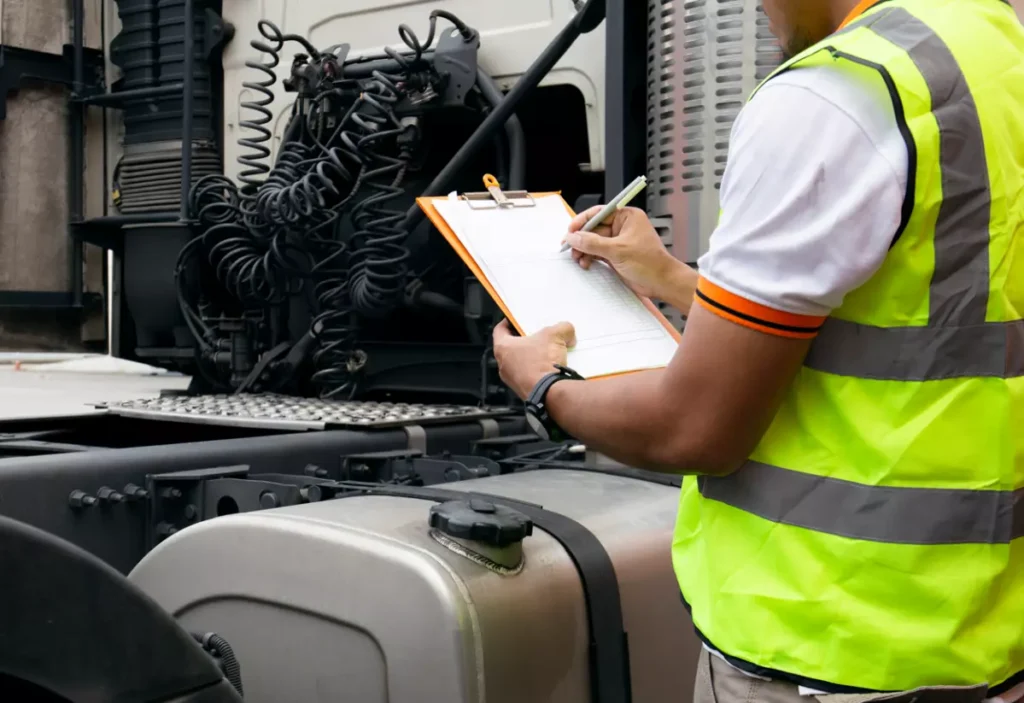Heavy truck inspections are an important part of keeping vehicles running safely and efficiently. Regular inspections can help to identify and address potential issues that can lead to unscheduled downtime. There are a variety of inspections that should be conducted, including pre-trip, post-trip, and annual inspections.
The benefits of regular inspections include increased safety, improved efficiency, and reduced maintenance costs. Common problems found during inspections include worn tires, faulty brakes, and electrical issues.
Best practices for inspections include being thorough, documenting findings, and addressing any identified issues promptly. Proper inspections can help to ensure that heavy truck operators stay safe and on the road.
Key Takeaways
- Regular inspections prevent unscheduled downtime and ensure safe operations.
- Thorough inspections detect minor issues before they become major problems.
- Inspections identify and correct safety issues to prevent accidents and injuries.
- Third-party inspectors should be used for larger fleets to ensure proper inspection.
Importance of Inspection
Frequently inspecting heavy trucks is essential for avoiding costly unscheduled downtime and ensuring a safe and smooth running operation. A well-timed and thorough inspection can help detect minor issues before they become major problems, thereby extending the life of the truck and avoiding costly repairs or replacements. Additionally, a properly executed inspection can help to identify and correct safety issues before they lead to accidents, injuries, or fatalities.
For smaller fleets, inspection can be done by an in-house mechanic, but for larger fleets, it is important to use a third-party inspector who is certified to conduct heavy truck inspections. This will help to ensure that the inspection is done properly and by established standards. The inspector should be trained to look for telltale signs of wear and tear and to know what issues to look for in each make and model of a heavy truck.
Inspection is a critical component of heavy truck maintenance and should not be overlooked. Performing regular inspections can help to identify potential problems early, and can help to keep heavy trucks running properly and safely. Investing in regular inspections can help prevent costly unscheduled downtime and ensure that the fleet is running efficiently and safely.
Also Read: Tire Shop In Beckley WV
Types of Inspections
Four main types of inspections can be conducted to ensure the safety and efficiency of heavy trucks: pre-trip, post-trip, periodic, and emergency. A pre-trip inspection is performed before a truck is in operation and checks for operational safety, such as tire pressure, fluid levels, and lights.
A post-trip inspection is performed after a truck has completed its journey and verifies that it is in the same condition as it was when it left. Periodic inspections are conducted at regular intervals, such as every 3,000 miles, and are used to ensure that the truck is running properly.
Emergency inspections are performed when a problem is suspected, such as a malfunctioning part or an engine error. Each of these inspections can help prevent unscheduled downtime, which can be costly for businesses. Pre-trip inspections can help identify potential problems before they become serious and cause downtime, while post-trip inspections can verify that the truck is in the same condition as it was when it left.
Periodic inspections can catch issues early and prevent them from becoming major problems, while emergency inspections can help identify and fix issues quickly. All of these inspections are essential to ensuring the safe and efficient operation of heavy trucks.
Benefits of Regular Inspections
Carrying out regular inspections can help maximize the efficiency and longevity of heavy trucks, avoiding costly unscheduled downtime. For businesses, the most obvious benefit is the prevention of costly repairs or replacement costs. Regular inspection can identify potential issues before they become more serious problems, thus minimizing the risk of breakdowns. Additionally, it can also detect any mechanical or electrical faults and ensure optimal performance of the truck.
Regular inspections can also increase safety on the roads. By ensuring that all components are functioning correctly, it can help to reduce the risk of accidents and improve overall road safety. It can also help to reduce the amount of fuel consumption, as any minor issues can be identified and rectified. This can help to reduce running costs and increase overall efficiency.
Finally, regular inspections can help to ensure that the vehicle meets the legal requirements, avoiding any fines or penalties. By ensuring that the truck is compliant with relevant legislation, it can help to minimize the risk of legal action.
Common Problems Found
When inspecting heavy trucks, a variety of common problems can be found. Issues may range from minor to serious, but all should be addressed promptly to prevent further damage or costly repairs. Examples of common problems that can be discovered during inspections include worn tires, cracked windshields, and damaged hoses. In addition, oil and fluid levels should be checked and any necessary fluid changes should be made. Furthermore, belts, brakes, and other parts should be examined for signs of wear and tear.
Inspections are also a great opportunity to uncover larger or more complex issues such as engine or transmission problems. It is important to note that if any of these problems are present, they should be addressed promptly. Unaddressed issues can lead to costly repairs and even unplanned downtime, which can be especially damaging for businesses.
Check Also: Best Diesel Truck Repair Shop
Best Practices for Inspections
To ensure heavy trucks remain in optimal working condition and avoid costly and disruptive unscheduled downtime, it is important to understand and follow best practices for inspections. Inspections should be conducted at regular intervals, with a full inspection at least once a year.
During an inspection, all components of the truck should be thoroughly checked and any issues should be addressed immediately. The engine should be checked for fluid levels, fuel filters checked for blockage, and all hoses, wires, and belts checked for wear. Brakes, tires, and suspension should be examined for signs of wear and tear.
The interior of the truck should also be inspected for any worn or frayed components and any safety and comfort features should be checked and adjusted as needed. Care should also be taken to ensure all necessary documents are up to date and that the truck complies with all applicable laws. Finally, the truck should be cleaned and all necessary fluids should be topped off.
Best practices for heavy truck inspections can help keep trucks running reliably and minimize the risk of unscheduled downtime. Following these practices can help ensure the safety of the driver and those around them and can help keep costs down in the long run. By following these best practices, fleet owners and operators can ensure their trucks are running safely and efficiently.
Frequently Asked Questions
How Often Should Heavy Trucks Be Inspected?
Heavy trucks should be inspected at regular intervals, such as every 6 to 12 months or after a certain number of miles, in order to ensure optimal performance and safety.
What Qualifications Are Needed to Carry Out a Heavy Truck Inspection?
Qualifications to carry out a heavy truck inspection include knowledge of motor vehicle mechanics, an understanding of industry safety standards, and a valid driver’s license.
How Much Does a Heavy Truck Inspection Cost?
The cost of a heavy truck inspection can vary depending on the type of inspection and the complexity of the truck. Generally, inspections range from $100 to $250.
Are There Any Legal Requirements for Heavy Truck Inspections?
Yes, there are legal requirements for heavy truck inspections. Depending on the jurisdiction, there may be required safety inspections and certifications that must be completed before operation.
What Materials and Tools Are Needed to Conduct a Heavy Truck Inspection?
To conduct a heavy truck inspection, materials and tools such as a flashlight, screwdriver, tire gauge, and lubricant are needed. Additionally, a knowledgeable technician and access to the truck’s manual are essential.
Conclusion
Regular truck inspections are essential for keeping heavy trucks running at peak efficiency and reducing unscheduled downtime. In addition to helping identify and prevent potential problems, regular inspections can help ensure that trucks comply with safety and emissions standards. Inspections can also save money in the long run by identifying and fixing problems before they become major issues. As such, it is important for trucking companies to make regular inspections a priority and to adhere to best practices for conducting inspections.



